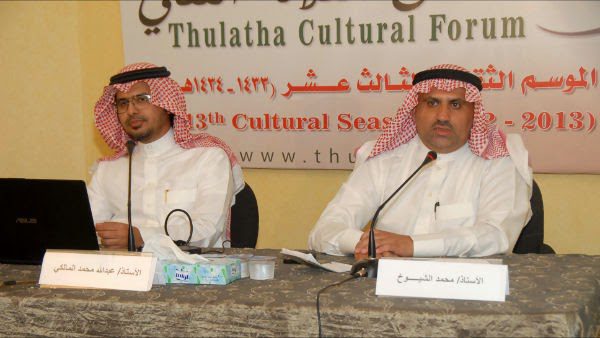The speaker expressed his pleasure to visit Qatif for the first time, and considered his participation in Althulatha Cultural Forum as a step for promoting intercommunication between the citizens of this nation and a way for boosting intellectual dialogue between intellectuals in Saudi Arabia.
He started the lecture confirming the necessity to constantly discuss major issues by diverse intellectual groups. He indicated that discussion on the issue of applying the law of Shariah is a foregone conclusion to many people in this nation as well as the need for a civil state.
AlMaliki added that applying Shariah’s law under the light of the civil state would definitely attach people to religion. He mentioned that the concept of applying the law of Shariah was not fully explored and understood; as both Islamists and secularists have varied perception to the issue of applying it.
He stressed the necessity of understanding the concept of applying the law of Shariah before deciding to accept or reject it, and underlined the significance of discussing the concept of civil state instead of arguing over the Shariah.
He illustrated that the concept of applying the law of Shariah is not sacred; but must be discussed and criticized because it is political not religious. The concept emerged in the middle of the last century when the modern Arab states were established after the fall down of the Ottoman dynasty due to abolishing some strict regulations and harsh punishments.
The lecturer cleared the methodical frame for the relationship between the Shariah and the civil state through a set of rules. Most prominent of which are the consensus of citizens to undergo to the law, the executive authority must be elected and reflects the population’s will and interests and distinguishing between the absolute, divine legislation and the legal application or legislation.
AlMaliki, also, insisted on the necessity of differentiating between the closed democracy which results in one party and open democracy which leads to a political diversity. He explained that open regimes definitely result in free societies capable of designating the proper application of Shariah’s law.
A space was provided to the attendants to share their thoughts and wonders. Dr. Tawfiq AlSaif, an intellectual and a political thinker, commended AlMaliki depicting him as a deep-thinker and a bold critic. He said that the concept of the state making the society was brought to Muslims by the Greeks, and added that Arab states dominate parties and groups. He, also, emphasized that the controversy over the religious state and the civil state is a byzantine one, and there is no substitution for the religious state in Muslim societies.
Sheikh Hasan AlSaffar, a prominent Shiite leader from Qatif, confirmed the importance of liberating the nation’s will from the dominance of the state as a priority for achieving transformation affirming the need for presenting thoughts and ideas in a bold and transparent way. Husain AlAlq, a writer, called for rereading the concept of applying the law of Shariah which greatly occupies the discussions of cultural and political communities.
As an accompanying program, the Forum invited Ahmad AlZaher to speak about his experience in photography and to show his winning photos in international contexts.
Friday, 30 January, 2026
Trending
- منتدى الثلاثاء يناقش نشأة الحضارات الإنسانية
- القطيف تحتفي بالمفكر البليهي وتناقش نظرياته
- ثقافي / “الرؤية الإنسانية والعقل” .. ندوة بمنتدى الثلاثاء بالقطيف
- مثقفو الوطن يحتفون بتكريم المفكر ابراهيم البليهي في القطيف
- طروحات البليهي الفكرية على طاولة تشريح المثقفين
- This week’s topic: Che Content And Role Of Personal Libraries
- Althulatha Forum discusses the Scientific Inspiration and Future Orientations
- الاستاذ عبد الله البوشي – (لواء سابق)
- المهندس شفيق آل سيف
- الدكتور منصور المرزوقي
You might also like

